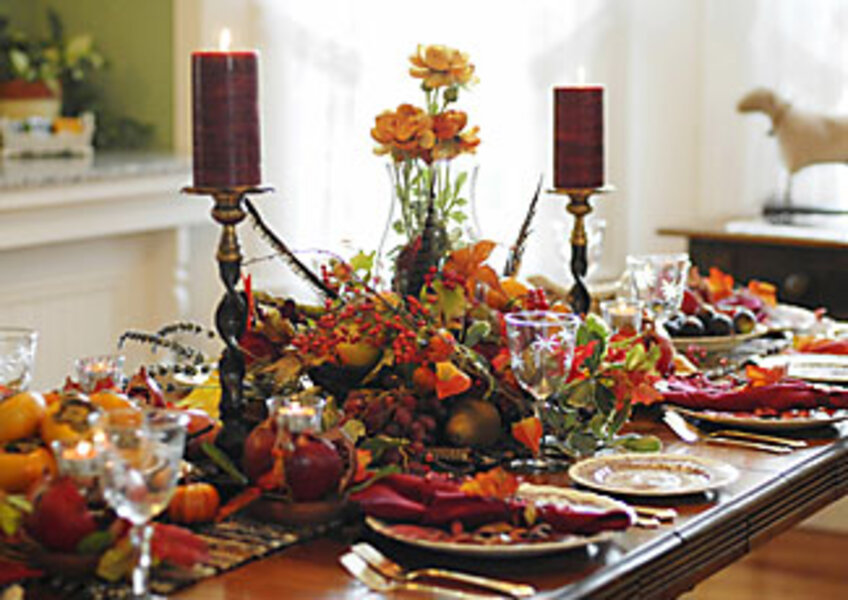What was this holiday in November?
Loading...
"I'm not celebrating Thanksgiving."
"Why?"
"It's their holiday. I don't know what it's about. Besides, what's there to celebrate?"
I looked at the middle-aged Russian woman. She had settled in our town recently, and I hardly knew her. Yet, I knew her very well, for, reflected in her tired eyes, I saw myself many Thanksgivings ago.
Every time I heard the phone ring, I felt like dashing to the bedroom, covering my head with a pillow, and pretending that I was still in Moscow.
The honeymoon phase of immigration had passed – when the never-before-seen abundance of food sent me into a trance, and aisles of Wal-Mart clothes thrilled me as much as a field trip to Lenin's Mausoleum. But a new reality had set in – a nagging fear that I'd never make it in America and that bringing my young daughter here was the most irresponsible thing I had ever done.
The phone kept ringing. I picked it up, muttered, "I don't speak English," and immediately hung up. At night, it rang again, and my daughter, who knew some English, answered it.
"The Hermanns are inviting us over for Thanksgiving dinner," she translated.
"Thanksgiving? What's that?"
"A holiday."
"What's it about?"
"I'm not sure."
Americans had invited us to meals before, and I appreciated their effort, although not the food. One family cooked us a Mexican dinner. The only thing I knew about Mexican culture was that they wore sombreros. As for the food, I had no idea what it consisted of, so when I bit into a jalapeño pepper, I was surprised and unprepared for the spicy aftereffect. The alarmed hosts rushed to me with a glass of ice water, the only drink they had at that meal. Where I came from, nobody served tap water to guests.
Another time, we were invited to a Chinese restaurant. I wasn't familiar with Chinese food either. Also, we weren't given knives and forks, and I couldn't eat with the chopsticks they gave me. So I left that feast hungry.
On Thanksgiving, I timidly opened the door of a two-story brick house from which came wonderful aromas of food. What were we celebrating?
Back in Russia, we celebrated the anniversary of the Great Socialist Revolution in the fall. A large military parade took place in Moscow's Red Square. Rocket launchers, nuclear missiles, and tanks shook the square's cobblestones, thousands of troops goose-stepped, and "volunteer" factory workers paraded past Lenin's red-granite mausoleum, where high government officials waved and smiled to shouts of "Slava!" (glory) from the crowd.
None of it seemed relevant now. No tanks rolled through our Midwestern town, and no military marches were heard.
Could Thanksgiving be a religious holiday? I had vague recollections of Thanksgiving prayers in the Russian Orthodox Church. Yet, there wasn't a single onion-shaped dome in our town.
What holiday was it, then?
The house was decorated with carved pumpkins and mums. On the table rested a large brown turkey, a gravy boat, a bowl of cranberry sauce, carrots, beans, sweet potatoes, and pies.
I wasn't used to turkeys – chickens and ducks were more common back home – but I liked the taste. I didn't touch the cranberry sauce, though. (Who eats poultry with jam?) Sweet potatoes looked weird (aren't potatoes supposed to be white and salty?), so I skipped them, too.
I also skipped the pumpkin pie. My mother used pumpkins to make kasha (porridge), not a dessert! There was some kasha-looking dish on the table called "dressing." To me, "dressing" implied putting on clothes, so I didn't try it.
When the dinner ended, I asked my daughter to inquire about Thanksgiving. "Oh, Thanksgiving started at the time of the Pilgrims. They celebrated their first harvest and good fortune. And we, like them, express gratitude for everything we have," she was told.
I had never studied American history, and the only pilgrims I'd heard about were people traveling to holy sites in the Middle East, not in America. As for gratitude, I mentally reviewed my situation. Formerly an engineer, I now worked nights at a retirement home making minimum wage. I rented a small apartment and drove a rusty car. I had no friends, and my daughter was my only family. I couldn't even speak English. I had little to celebrate, I thought.
Many things have happened since then. Gradually, I learned English. Later I met and married a wonderful man, and, in time, my daughter became a mother herself. My life was similar to the lives of others who came here before and after me – with work and worries, sadness and happiness.
As for Thanksgiving, it became mine, too, because who are we immigrants, if not pilgrims? Like them, we come to a place we don't know much about. Like them, we rely on the kindness of strangers. Like them, we go through hard times. And like them, we come to appreciate our good fortune.
I looked at the Russian woman. "You'll celebrate Thanksgiving," I said. "You'll see. Just remember our Russian saying: 'Without effort, one cannot pull even a small fish from the pond.' "





